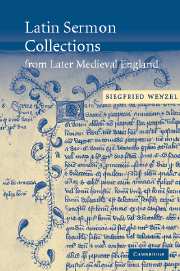Book contents
- Frontmatter
- Contents
- Preface
- Acknowledgments
- Editorial conventions
- Notes on the text
- Sigla
- List of abbreviations
- Prolegomena
- Part I The Collections
- 1 Overview
- 2 John Sheppey (SH)
- 3 Richard FitzRalph (FI)
- 4 Oxford, Bodleian Library, MS Auct. F. infra 1.2 (F)
- 5 John Waldeby (WA)
- 6 Thomas Brinton (BR)
- 7 Philip Repingdon (RE)
- 8 John Felton
- 9 Mirk's Festial
- 10 Robert Rypon (RY)
- 11 Cambridge, Pembroke College, MS 199 (P1)
- 12 Cambridge, Pembroke College, MS 257 (P2)
- 13 Cambridge, Gonville and Caius College, Ms 356/583 (C)
- 14 Oxford, Bodleian Library, MS Bodley 649 (O)
- 15 Oxford, Bodleian Library, MS Laud misc. 706 (R)
- 16 Oxford, Bodleian Library, MS Laud misc. 200 (L)
- 17 Oxford, Bodleian Library, MS Lat. th. d. 1 (Q)
- 18 John Dygon (DY)
- 19 Oxford, Magdalen College, MS 96 (CO)
- 20 Oxford, Balliol College, MS 149 (S)
- 21 Henry Chambron
- 22 Toulouse, Bibliothèque Municipale, MS 342 (D)
- 23 Cambridge, University Library, MS Kk.4.24 (B)
- 24 Cambridge, Jesus College, MS 13 (J)
- 25 Worcester, Cathedral Library, MS F.126 (X)
- 26 Worcester, Cathedral Library, MS F.10 (W)
- 27 Hereford, Cathedral Library, MS O.iii.5 (E)
- 28 Oxford, Trinity College, MS 42 (V)
- 29 Richard Alkerton
- 30 Thomas Wimbledon, “Redde rationem”
- 31 Cambridge, University Library, MS Ii.3.8 (A)
- 32 Arras, Bibliothèque de la Ville, MS 184 (254) (Z)
- 33 London, St. Paul's Cathedral Library, MS 8 (Y)
- 34 London, British Library, MS Harley 331 (H)
- 35 Manchester, John Rylands Library, MS Latin 367 (M)
- 36 Oxford, Bodleian Library, MS Barlow 24 (N)
- 37 Cambridge, Corpus Christi College, MS 392 (K)
- 38 On the margins
- Part II Occasions of Preaching
- Part III Orthodox Preaching
- Final reflections
- Inventories
- Works cited
- Index
15 - Oxford, Bodleian Library, MS Laud misc. 706 (R)
from Part I - The Collections
Published online by Cambridge University Press: 22 September 2009
- Frontmatter
- Contents
- Preface
- Acknowledgments
- Editorial conventions
- Notes on the text
- Sigla
- List of abbreviations
- Prolegomena
- Part I The Collections
- 1 Overview
- 2 John Sheppey (SH)
- 3 Richard FitzRalph (FI)
- 4 Oxford, Bodleian Library, MS Auct. F. infra 1.2 (F)
- 5 John Waldeby (WA)
- 6 Thomas Brinton (BR)
- 7 Philip Repingdon (RE)
- 8 John Felton
- 9 Mirk's Festial
- 10 Robert Rypon (RY)
- 11 Cambridge, Pembroke College, MS 199 (P1)
- 12 Cambridge, Pembroke College, MS 257 (P2)
- 13 Cambridge, Gonville and Caius College, Ms 356/583 (C)
- 14 Oxford, Bodleian Library, MS Bodley 649 (O)
- 15 Oxford, Bodleian Library, MS Laud misc. 706 (R)
- 16 Oxford, Bodleian Library, MS Laud misc. 200 (L)
- 17 Oxford, Bodleian Library, MS Lat. th. d. 1 (Q)
- 18 John Dygon (DY)
- 19 Oxford, Magdalen College, MS 96 (CO)
- 20 Oxford, Balliol College, MS 149 (S)
- 21 Henry Chambron
- 22 Toulouse, Bibliothèque Municipale, MS 342 (D)
- 23 Cambridge, University Library, MS Kk.4.24 (B)
- 24 Cambridge, Jesus College, MS 13 (J)
- 25 Worcester, Cathedral Library, MS F.126 (X)
- 26 Worcester, Cathedral Library, MS F.10 (W)
- 27 Hereford, Cathedral Library, MS O.iii.5 (E)
- 28 Oxford, Trinity College, MS 42 (V)
- 29 Richard Alkerton
- 30 Thomas Wimbledon, “Redde rationem”
- 31 Cambridge, University Library, MS Ii.3.8 (A)
- 32 Arras, Bibliothèque de la Ville, MS 184 (254) (Z)
- 33 London, St. Paul's Cathedral Library, MS 8 (Y)
- 34 London, British Library, MS Harley 331 (H)
- 35 Manchester, John Rylands Library, MS Latin 367 (M)
- 36 Oxford, Bodleian Library, MS Barlow 24 (N)
- 37 Cambridge, Corpus Christi College, MS 392 (K)
- 38 On the margins
- Part II Occasions of Preaching
- Part III Orthodox Preaching
- Final reflections
- Inventories
- Works cited
- Index
Summary
As indicated, four sermons of the first set in MS Bodley 649 (O/1) also appear in MS Laud misc. 706. Patrick Horner, who has studied the latter manuscript in detail, describes it as “a composite manuscript assembled from sermons made and collected by Benedictine monks at Oxford in the fifteenth century.” According to an ex libris on its last folio, the book belonged to John Paunteley, Benedictine monk of St. Peter's Abbey, Gloucester, who had been ordained a priest in 1392 and incepted as “professor sacre pagine” at Oxford. On 3 May 1412 he preached the funeral sermon of his abbot, Walter Froucetur, which is preserved as R-3. Some of the sermons, however, may go back to earlier times. The first sermon here, on “How shall the realm stand?” and for the third Sunday of Lent, applies a story from Augustine's De urbis excidio to contemporary England and declares:
In our East a frightful cloud is rising up against us, by which I understand the kingdom of France. Our enemies, the French, are preparing arms with high council and the support and help of all their friends and are lifting their bow to our destruction!
Against this danger, the preacher urges going to confession and prayer. Fear of an imminent French invasion disturbed England particularly in the late 1380s, and the sermon could well belong to that time.
The manuscript, consisting of several booklets, is written by several hands, all of the early fifteenth century.
- Type
- Chapter
- Information
- Latin Sermon Collections from Later Medieval EnglandOrthodox Preaching in the Age of Wyclif, pp. 88 - 90Publisher: Cambridge University PressPrint publication year: 2005



